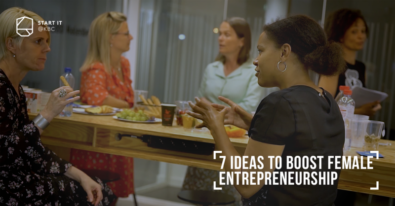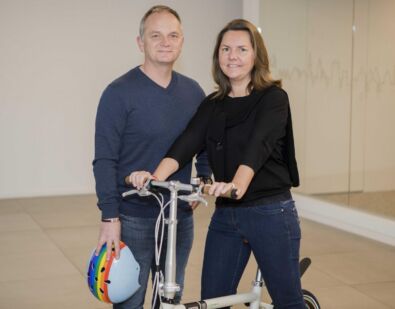From machos to cowboys, from ninjas to sheriffs: 7 ideas to boost female entrepreneurship

Female founders are definitely on the rise, but the big majority of the startups in the Start it @KBC community is still 100% male. Boy and girl stereotypes, macho VC’s, ninjas and rockstars, cowboys and sheriffs: they all figured in a roundtable that we hosted on the subject. We filtered out 7 ideas to further boost female entrepreneurship, not only within our community but in society as a whole. 7 ideas that will hopefully fire up the debate!

1) A good balance between high flying risky tech startups and less scalable, non-tech startups.
Anna Thomlinson, managing director Start it @KBC and community manager Start it @KBC Brussels: “When we review the team, the product and the potential of the startups that apply at Start it @KBC, male and female entrepreneurs roughly get the same score. Yet, we end up accepting far less female founders. I think the business model might be an explanation. Many of the women who want to get into our acceleration program have product based businesses. And those business models are harder to scale than tech startups.”
Frank Maene, managing partner Volta Ventures: “As an investor, I’m probably too much macho. When I talk to startups, I ask them: ‘Do you want me as an investor? Because the consequence is that you will need to grow aggressively, you will need to hire aggressively, you will need to take more risk.’ I think there should also be room for startups that don’t seek that hyper road. There’s great potential these days for non-tech startups. Tech is great, but I can’t drink software. There should be a good balance between the high flying risky tech startups and other startups that are less scalable and less risky.
Isabelle Moussiaux, founder & managing partner Happy Bags: “How do you draw the line though? With our quality teas and infusions, we are aiming for the world. We ship to Japan and other faraway countries. Our product is very scalable. But I would probably have been ranked among the startups that don’t reach for those stars. It’s a dangerous game.”
Katrin Geyskens, partner at Capricorn Venture Partners: “We also see the media mainly paying attention to the tech startups, the type of startups that fit into the well-known VC model and raise the spectacular amounts of money. Maybe the startups that grow a little slower, but also create a lot of jobs and a lot of added value, deserve a little more attention as well?”

2) Don’t just look for the ninjas and the rockstars
Wietse Van Ransbeeck, co-founder CitizenLab: “Don’t wait until you are over 10 people to start hiring women, look for female leaders from the very start. We did that with CitizenLab because we want to make our business accessible and attractive to women. That means we also pay attention to how we phrase things. We don’t just go for the ninjas and the rockstars, and other typically male startup slang.”
3) A startup needs a cowboy and a sheriff.
Ineke Rampart, corporate affairs director Telenet: “In order to be successful, you need different profiles. It’s not about men or women, it’s all about complementary skills: the visionary one, the COO, the CFO,… ”
Katrin Geyskens: “Indeed, companies need different roles and types. Diversity is a huge asset. Not just in gender but also in background, in degree, in age, in nationality.”
Isabelle Moussiaux: “I strongly believe in mixed teams. If my male partner and I go to the bank or pitch to investors, they get the story from me and the numbers from him. That combination works. We are yin and yang.”
Frank Maene: “Startups need a cowboy and a sheriff. The cowboy runs around and conquers the Wild West, while the sheriff makes law and order.”

4) Female role models are worth their weight in gold.
Bieke Van Gorp, co-founder FibriCheck: “At Start it @KBC, I see some great role models. But I never had a female mentor myself. My male mentors are great, don’t get me wrong, but I am eager to learn from a female entrepreneur. Someone who is 10 years ahead of me, someone who has already travelled the path I am following now.”
Anna Thomlinson: “At the last accelerator I worked for in Great Britain, we ran a campaign to dramatically increase the number of female mentors. And we spectacularly failed. I had the impression that a lot of female role models were afraid of the longterm commitment. That’s a barrier I have never heard from male mentors.”
Saar Dietvorst, moderator roundtable & founder Content Cats: “Women, more than men, still combine two roles: they keep a business running, and they often also keep a household running. Is that something female entrepreneurs and mentors struggle with?”
Isabelle Moussiaux: “Absolutely. We are also true role models in the way that we juggle both our businesses and our private lives. We should show other women that being pregnant or running a household doesn’t have to kill ambition. So they will never have to say: ‘I should have…’. We need to nurture the next generations now. I raise my daughters to be not afraid to at least try.”
5) Get more girls into STEM, and fire up their entrepreneurial spirit
Frank Maene: “At Volta Ventures, we get 2.500 requests for funding each year. Most of them in B2B tech, but only very few female ones. The mismatch starts at school: girls simply don’t do STEM. A few years ago I did the opening speech of the academic year for the department of Computer Sciences in Ghent: 200 students, but only 5 girls!”
Ineke Rampart: “There are fantastic programs like CoderDojo, who have special coding sessions for girls from 7 to 17 years old: Dojo for Diva’s. They focus on the endless opportunities of technology, and the solutions they come up with really blow you away. Change is on its way, there’s a new generation of creative girls knocking on our door.”
Anna Thomlinson: “You don’t even necessarily need to have a background in science, technology, engineering or mathematics to start a tech company. You can also surround yourself with the right people. In the UK, what you studied is less important in being able to do a job. In Belgium, but also in France, the importance of your specific degree still gets way too much weight.”
Bieke Van Gorp: “The lack of women in tech is not just due to girls not studying STEM. At Fibricheck, we do find tech ladies, but they generally don’t fancy working for startups. We get questions like: ‘How sure is your startup?’ ‘What is your financial situation?’ We did job interviews with very talented women, but in the end they choose for a bigger, more ‘secure’ company. So, yes, technological education is important, but it needs to go hand in hand with boosting the entrepreneurial spirit in all levels of society.”

6) We need colorblind VC’s
Katrin Geyskens: “All the money that goes to startups and scale-ups is well spent. I’m in favor of special funds for female founders, like ‘We Are Jane’ that Conny Vandendriessche recently started up, as long as they never, ever lower the bar. But I believe even stronger in having more balance in normal funds. “Colorblind” funds, where being a woman is not something special. At Capricorn, we managed to get the gender balance fairly right, and tip the scale in the right direction. But in general, the VC world is still very masculine. Research shows that VC’s tend to invest in people that look like them and talk like them. So they end up with all male, white, 40-ish people with an engineering background. That’s a shame, because startups would be so much more powerful with a mixed team.”
7) Be the boss. Shamelessly.
Wietse Van Ransbeek: “My co-founder Aline Muylaert and I started CitizenLab together and have the same level in the company. We own the company together and we lead it together. It strikes me that people just assume that I am the founder when they meet me, while she really has to stress out that she is a founder as well. She really needs her ‘co-founder’ title to gain credibility.”
Frank Maene: “I disagree with the “co-founder” title. As an investor, I want to see a CEO, the boss. Not a founder or a co-founder.
Katrin Geyskens: “In an early stage, co-founders often call themselves co-CEO. I’m sorry, but that doesn’t work. In the end, we want one person who has the final responsibility. Especially when you are growing fast, the co-CEO-model is not sustainable.”
Katrin Geyskens: “That being said, you often see men standing on a stage, radiating confidence, while women are standing next to that same stage. They keep the man on stage with his both feet on the ground, but they keep the company running and get things done. Less visible, but equally or even more important for the business.”
Isabelle Moussiaux: “Men tend to exaggerate. I am not afraid to talk about my successes, but it wouldn’t feel right for me to make myself bigger than I am. But maybe it’s smarter to be more like men, and to more or less ‘fake it until you make it’.”
Ineke Rampart: “It’s a good thing that there are different styles. My main advice for female founders is that they should be authentic. The last thing you should do is try to imitate men.”
Start it @KBC actively takes initiatives to promote female entrepreneurship. We see the number of female founders rise with every pitchwave, but there’s still work to do. Do you have other ideas to boost female entrepreneurship? Join the debate and share them with us!
Dreaming of your own startup? You can apply all year through at www.startit.be.
you want to become a female mentor? Then apply here: www.startit.be/mentorship.